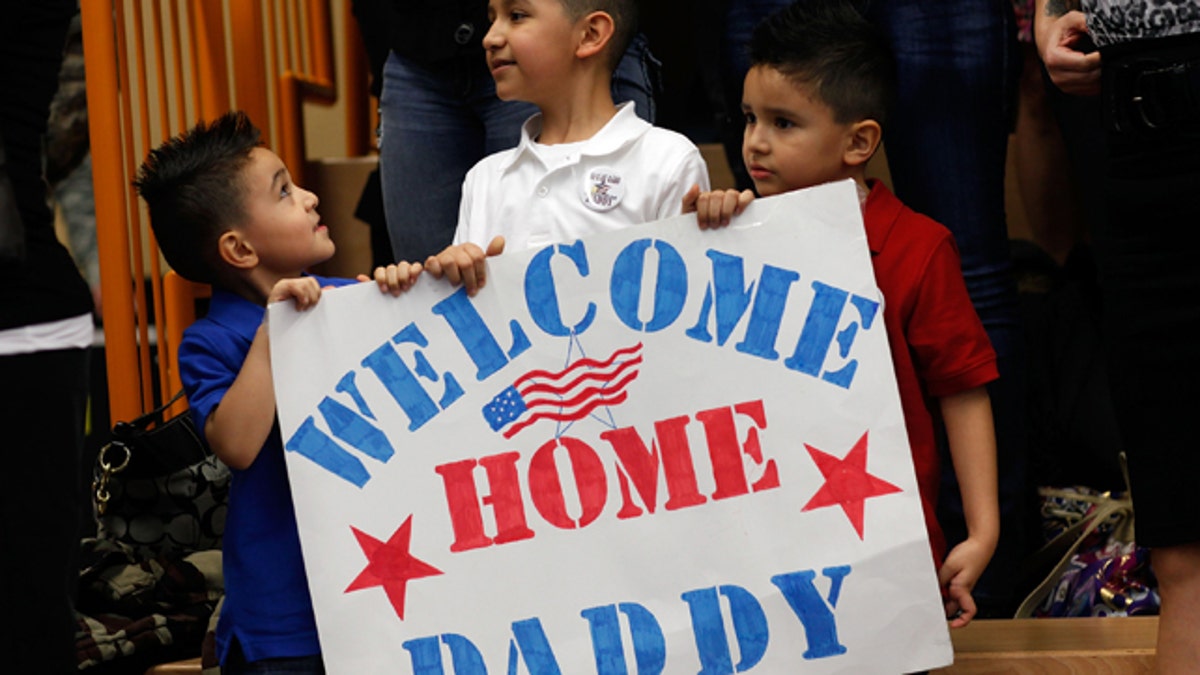
Family members wait for their loved ones of the 170th U.S. Army Infantry Brigade upon the troops' return from Afghanistan at U.S. Army Garrison Baumholder on January 28, 2012 in Baumholder, Germany. (Photo by Ralph Orlowski/Getty Images) (2012 Getty Images)
Some relatives of U.S. service members living in the country illegally will be spared from deportation and allowed to apply for legal status, according to an Obama administration policy directive issued Friday.
The nine-page memorandum is the latest in a series of immigration policy changes made by President Barack Obama since he took office. The department has long had the power to stop deportations for relatives of military members and veterans, but Friday's memo lays out how and when it can be used.
The latest order gives U.S. Citizenship and Immigration Services, a Homeland Security Department agency, the power to "parole in place" immigrant spouses, children and parents of current U.S. service members, reservists and veterans. The change means that those immigrants can apply to legally live in the United States.
Margaret D. Stock, an Alaska-based immigration attorney and retired Army reserve lieutenant colonel, said the latest directive would likely impact thousands of military families. "It is very significant," Stock said. "It will ease the strain on so many families and military members."
Peter Boogaard, a Homeland Security Department spokesman, said the policy change would help "reduce the uncertainty our active duty and retired military personnel face because of the immigration status of their family members."
Obama is relying more often on making relatively minor administrative changes to America's complicated immigration system, as the likelihood dims that Congress will overhaul the law. He pledged twice as a presidential candidate to pass immigration reforms.
Obama's changes initially were broad and controversial. He instructed the government to use its discretion to find and deport only the most serious criminals. Then in mid-2012, he announced a plan to offer young immigrants in the country illegally a reprieve from deportation and work permits for at least two years.
Now, as it appears less likely that Congress will change immigration laws, the White House is chipping away at the edges with relative minor procedural changes.
U.S. Immigration and Customs Enforcement told managers in August how to deal with immigrant parents or legal guardians of young children. The memo said that before someone is deported, ICE officials should consider whether he or she is the primary caregiver for a minor child, has a direct interest in a family court or welfare proceeding or is the parent or guardian to children who are U.S. citizens or legal permanent residents.
The administration has also allowed immigrant spouses and children of U.S. citizens to stay in the United States in some cases.
Other rule changes gave more flexibility to the Homeland Security Department's use of immigration holds for people in local jails.
House Republicans have long criticized the administrative changes, arguing he's side-stepping their involvement in the process.
Obama has repeatedly said immigration reform is a top priority of his administration. His selection of Jeh Johnson, the Pentagon's former top lawyer, who has no immigration experience, as the next Homeland Security secretary signals that the White House, rather than the department, will now lead the push for immigration law changes.
The Senate earlier this year passed a sweeping bill that called for the doubling of the Border Patrol and a path to legal status for the nearly 11 million immigrants already living illegally in the country.
But activity has stalled in the House. On Wednesday, House Speaker John Boehner said the House will not hold formal compromise talks on the Senate-passed bill. It faces strong opposition from House Republicans who have objected to a comprehensive approach. Many of them don't like the idea of offering citizenship to people who broke immigration laws to travel to the U.S.
During a citizenship swearing-in ceremony, Vice President Joe Biden on Thursday said he was "extremely disappointed" with Boehner's pronouncement.
Based on reporting by The Associated Press.












































